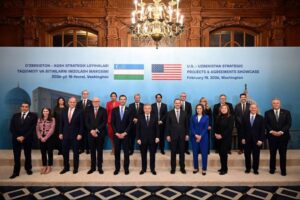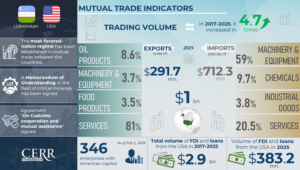Uzbekistan and Azerbaijan Presidents Hold Historic Meeting, Sign Treaty on Allied Relations

Tashkent, The Gulf Observer: At the Kuksaroy Residence, President of the Republic of Uzbekistan Shavkat Mirziyoyev and President of the Republic of Azerbaijan Ilham Aliyev held a significant meeting in a contracted format, followed by the first session of the Supreme Interstate Council. The discussions focused on deepening and enhancing the strategic partnership and multifaceted cooperation between the two nations.
President Mirziyoyev highlighted the historic nature of the state visit by President Aliyev, stating, “Today, we will sign the Treaty on Allied Relations. In just a few years, we have managed to raise relations between Uzbekistan and Azerbaijan to the highest level of interstate interaction.” This treaty is expected to further solidify the ties between the two countries, marking a new chapter in their bilateral relations.
The leaders expressed satisfaction with the inaugural session of the Supreme Interstate Council, which is set to become an effective mechanism for advancing multifaceted cooperation and enriching it with tangible initiatives. Both presidents acknowledged the dynamic development of bilateral ties, noting the close contacts established between parliaments, governments, industry departments, and regions. Regular meetings of the Intergovernmental Commission and Business Council, along with forums, exhibitions, and numerous cultural events, have further strengthened the partnership between the two nations’ business circles.
As part of the ongoing efforts to expand cooperation, the presidents will meet with representatives of leading companies from both countries and launch new joint projects. The meeting also highlighted that 2024 marks the 30th anniversary of diplomatic relations between Uzbekistan and Azerbaijan. To celebrate this milestone, President Mirziyoyev proposed preparing an event program and an annual schedule of intensive interdepartmental contacts and exchanges. Additionally, an agreement was reached to declare the following year as the Year of Economic Cooperation between Uzbekistan and Azerbaijan, with a comprehensive program covering 20 priority areas.
Key objectives were set to significantly increase trade turnover and transition to a new phase of industrial cooperation, including the implementation of projects in third countries. The leaders welcomed the outcomes of the business forum held the previous day, where a portfolio of promising projects worth over $2 billion was formed, covering sectors such as energy, chemicals, mining, textiles, agriculture, and urban development. The practical role of the Uzbekistan-Azerbaijan investment company in supporting these projects was also acknowledged.
The presidents emphasized the importance of enhancing connectivity between the two countries by implementing transport, communications, energy, and other infrastructure projects, including in a multilateral format. Agreements were reached to increase the frequency of flights, simplify land and air transportation procedures, and implement digital solutions to facilitate trade and travel. The importance of intensifying interregional contacts was underscored, with plans to adopt a separate Interregional Cooperation Plan for 2025 and a Partnership Program for the Development of Industrial Potential and Infrastructure of the Regions. The next Forum of Regions is scheduled to be held in Kokand.
In addition to economic cooperation, the leaders agreed to continue active exchanges in culture and art, education, healthcare, youth policy, information policy, and sports. It was noted with satisfaction that renowned cultural figures Farrukh Zakirov and Polad Bülbüloğlu were awarded the titles of People’s Artists of Uzbekistan and Azerbaijan, respectively.
President Mirziyoyev proposed launching a mechanism for regular meetings between the rectors of leading universities from both countries and holding a joint media forum. The prospects for building tourist and business complexes in the capitals of both nations were also discussed, with the aim of increasing mutual tourism and enhancing humanitarian and business exchanges.
The importance of information and analytical support for developing bilateral relations was emphasized, including the implementation of joint projects for in-depth analysis and the disclosure of cooperation potential.
The two presidents also exchanged views on international and regional issues, reaffirming their commitment to continuing intensive dialogue and mutual support within multilateral frameworks. Following the meeting, it was decided to adopt an action plan to ensure the timely and high-quality implementation of the agreements reached during the discussions.

